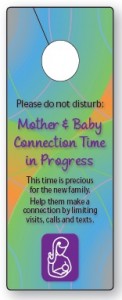Booby Traps Series: Is this a hospital room or Grand Central Station?
by Tanya Lieberman, IBCLC | October 27, 2011 12:08 am
 This is the 22nd in a series of posts on the Booby Traps, made possible by the generous support of Motherlove Herbal Company.
This is the 22nd in a series of posts on the Booby Traps, made possible by the generous support of Motherlove Herbal Company.
It’s postpartum day one for 29 nursing mothers and babies in an Ohio hospital who have agreed to participate in a study.
From 8:00 am to 8:00 pm, research assistants sit outside each room, counting the number of times the door is door is opened and someone enters - nurses, doctors, family, friends, food service, housekeeping, and anyone else - and keeping track of the duration of these interruptions as well as time spent alone. Research assistants count the number of phone calls the mother makes and receives as well. Each visitor is counted an an separate interruption, and partners are also counted when they entered the room.
Want to guess the average number of times mothers were interrupted by phone or in person? 54.
And what was the most common duration of time the mothers had alone with their babies? 1 minute.
The mothers were alone with their babies for an average of 24 times in the 12 hour period, and half of these episodes were 9 minutes or less. The average duration of a breastfeeding session was 20 minutes. This included a number of sessions that lasted zero minutes when a visitor entered and the baby was immediately removed from the breast.
Who were the people entering the room most frequently? The majority of the visits were from nurses and other care personnel, followed by the father and other visitors.
At the end of the day mothers were asked about their experiences (summarized by this La Leche League article):
1. How do you feel about the interaction and breastfeeding experiences with your baby today?
Typical responses: “They [breastfeeding sessions] were good, but it was hard having visitors; probably would have done it [breastfeeding] more. Tried to squeeze it in when visitors left.” “Not too many visitors, but the phone calls did make it harder to concentrate on the baby. The nurses’ visits helped because they showed me different techniques.”
2. Did you and your baby have enough quiet/uninterrupted time together?
Typical responses: “I had a very busy day and though I do feel I gave a lot of time and spent a lot of time together, I did feel very pressured.” “Wish we had more [alone time]. Both baby and myself were tired and I wanted to sleep with her. But every time I tried, we got interrupted.” “I felt like someone was constantly interrupting us and when we were able to breastfeed I felt rushed and worried that someone else would be coming in soon.”
 Of course, I am not suggesting that all interruptions are bad for breastfeeding. Some are clearly helpful to breastfeeding, like a visit from a lactation consultant, and having a partner and other supportive family and friends around can help, too.
Of course, I am not suggesting that all interruptions are bad for breastfeeding. Some are clearly helpful to breastfeeding, like a visit from a lactation consultant, and having a partner and other supportive family and friends around can help, too.
But look what happened in a 2010 study when a simple intervention was tried: hanging a “do not disturb” sign on the door when a mother was feeding her baby (one example of such a sign is above, from ILCA).
The number of interruptions to was significantly less in the ‘sign’ group than in the ‘no sign’ group. And 95% of the ‘sign’ mothers strongly agreed with the statement, “My breastfeeding sessions were successful, vs. 67% of the mothers who had no sign on the door. No difference was noted regarding the number of breastfeeding sessions, total minutes of breastfeeding sessions, or percentage of infant weight loss at day 2 of life.
Another interesting example comes from a number of Boston-area hospitals which, in the course of working toward becoming Baby Friendly, have are trying to “bundle” education about different topics together so that the number of interruptions is decreased. They’ve also tried to stop taking vital signs at midnight and at other times when the mother or aby is sleeping. This requires cultural and logistical changes, but it can be done.
Again, I am not saying that mothers shouldn’t have visitors or that hospital staff who have important business in the rooms should be banned from entering. I also want to acknowledge that there are interesting cultural questions here - among some families having lots of family around all the time is the normal and expected thing, and restricting visitation might actually make breastfeeding more challenging.
What I am saying is that the near constant stream of interruptions can make getting started with breastfeeding difficult, and that some thought should be given to prioritizing some privacy if mothers need it to make breastfeeding work. Yes, it might mean some inconvenience to hospital staff at first, but the same could be said about a lot of things which are now the standard of care, and which result in better breastfeeding outcomes.
For now, you may want to write in a request for privacy while feeding into your birth plan, talk with your partner about politely escorting family to the cafeteria at times, and maybe even making your own privacy sign.
Was your hospital room more like Grand Central Station? Did it have any impact on your breastfeeding experience in the hospital?
Source URL: http://www.bestforbabes.org/booby-traps-series-is-this-a-hospital-room-or-grand-central-station